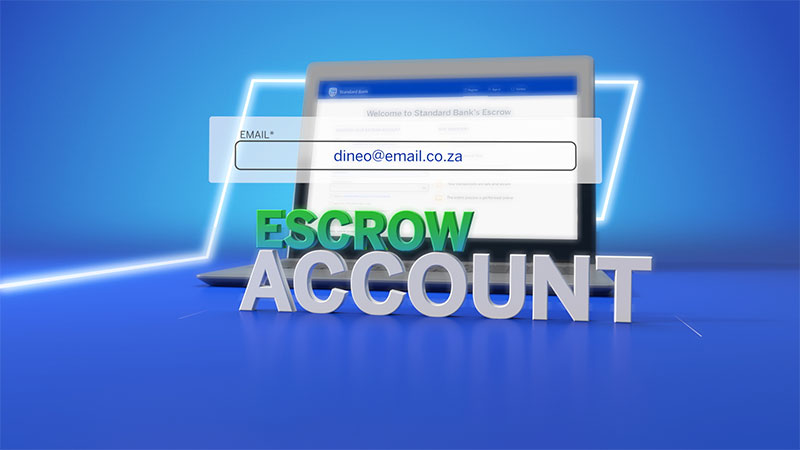Escrow service frequently asked questions
Escrow is an arrangement where a third party, such as Standard Bank, safeguards the funds of the buyer until all the terms of the agreement between the buyer and the seller have been met. Once the terms have been met and the buyer is satisfied with the seller’s product or service, the third party (in this case Standard Bank) will release the funds to the seller.
Any person or business who feels unsafe when transacting or trading. Buyers should use Escrow if they need to pay a deposit or full upfront payment before receiving the goods or services from a seller. Sellers should use Escrow to ensure the buyer has the agreed funds to transact.
Yes, non-Standard Bank customers will only be able to sell and not buy.
Registration is free.
We require some basic information from you that will be verified. The process of creating a user account will take less than five minutes. Mandatory information that we require includes:
For individuals:
- Full name
- ID number
- Email address
- Mobile number
- Bank account details
For businesses:
- Company type
- Company name
- Trading name
- Company registration number
- VAT number
- Bank account details
- Business address details
As a part of our continued efforts to ensure unauthorised individuals do not transact on behalf of a business, requests for confirmation and consent will be sent to designated individuals in the business for the authorised user to continue with account registration and transaction creation.
Insurance is usually covered by the parties of the transaction. Standard Bank is not liable for any damaged goods or services.
This can be decided in the contract terms.
The Standard Bank Escrow fee can be paid by:
- The buyer
- The seller
- The buyer and seller (50/50 split)
Not currently but we’re working on it.
You can easily set up your transactions on the Standard Bank Escrow system for partial release. Each progress payment will have its own release event.
The status and details of your transactions can be viewed at any time by signing into Escrow. If you have a personal or business profile, you will need to click on ‘Current Transactions’ under the selected profile to view the details of the transactions relevant to that profile.
We accept payments via EFT only.
Transfers from a Standard Bank account to the Standard Bank Escrow service should be almost instant. We will let all parties know immediately once the funds have been received and cleared.
Only payments via EFT are accepted.
The buyer has the following options:
- Request adjustments if the goods/services are misrepresented/not what was agreed upon. If the seller agrees, the buyer may be entitled to a partial refund with the remaining funds being disbursed to the seller
- Request an extension if delivery or inspection is taking longer than anticipated
- Dispute the trade, for any material misrepresentation, which will allow Standard Bank to freeze the funds until the dispute is resolved
If on the Completion Date the buyer has not accepted the goods/services, or has not followed one of the above options, the buyer will be deemed to have accepted the goods/services which authorises Standard Bank to release the funds to the seller.
It refers to the agreed timeline that the buyer has to inspect the goods or services.
If there is no action on the buyer’s part by the Completion Due Date, we may deem this an acceptance on the buyer's part, which may entitle us to release the funds to the seller.
We will do our best to contact the buyer to understand the reason for not accepting the goods or services before any automatic release.
The Standard Bank Escrow platform incorporates an embedded dispute resolution mechanism. If the parties cannot resolve the dispute on the platform within ten business days, Standard Bank has the right to refer the matter to:
- the Small Claims Court, if the dispute is declared by an individual (not a juristic person) and the value of the dispute is R20 000 or less; or
- arbitration, if the dispute is declared by a juristic person or the value of the dispute is more than R20 000. The arbitration will be facilitated by The Arbitration Foundation of South Africa (AFSA) and will be conducted in accordance with the AFSA’s rules. The parties will follow the rules for expedited domestic arbitrations as administered by the AFSA. The adjudicator’s decision is final and binding on both parties. For more information on the AFSA's rules for expedited domestic arbitrations, please refer to their website by clicking here
Standard Bank will safeguard the buyer's funds until the dispute has been finalised. We will only release the funds once we receive a court order, arbitration award or written agreement from the buyer and the seller that the dispute has been resolved.
The Completion Due Date or CDD is the date which we expect the transaction to be completed. This is to prevent buyers from delaying the process.
The CDD is calculated as the date where the goods or services were delivered plus the number of agreed days for delivery plus the agreed days for inspection.
You can top up your account at any time. An Escrow account allows you to store funds (in Rands) for the purpose of funding a transaction. These funds can be allocated to any future transaction that you are involved with for the purposes of paying the seller for a product or service.
Acceptance of the goods/service can only be done by the buyer on the Standard Bank Escrow platform. If you are satisfied, we will release the funds.
Standard Bank Escrow performs two daily payment runs at 10h00 and 15h00 every business day.
If authorisation to release the funds was received by Standard Bank before 09h00, payment will be made at 10h00 that morning. If authorisation to release the funds took place before 14h00, the payment will be made at 15h00 that business day.
On the Sign In page, click the “Forgot Password” button. We will send you an OTP to your registered mobile number which will allow you to enter and confirm a new password.
No party to the trade will earn interest on any amounts held in Escrow, regardless of whether a dispute is declared or how long we hold the funds for.





























